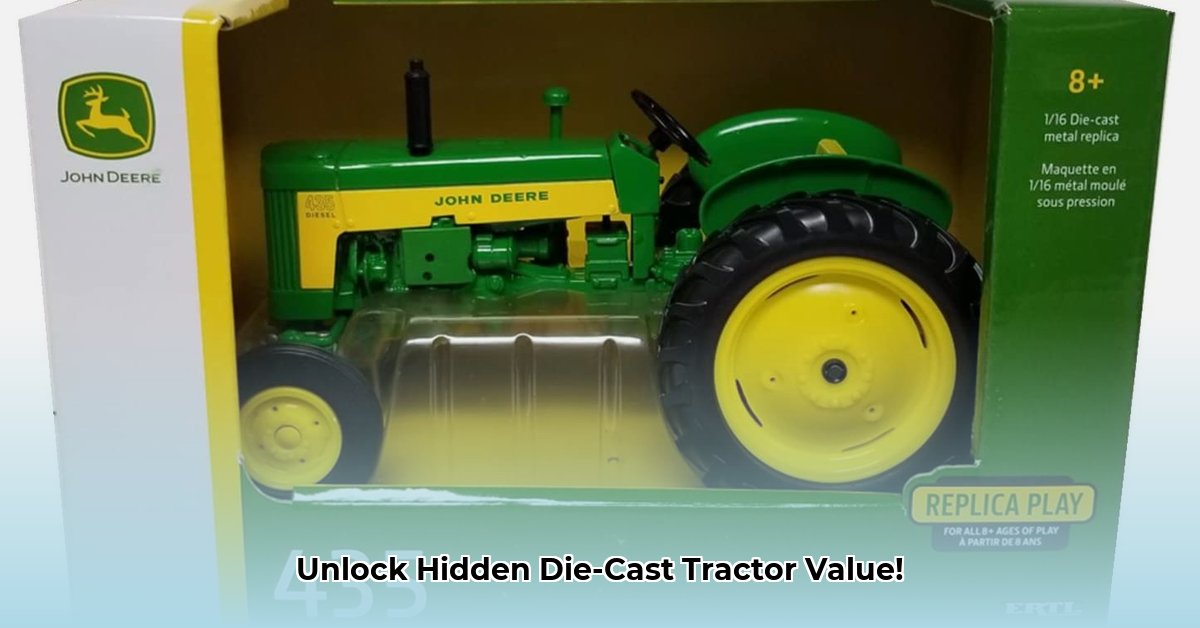
The world of diecast tractors is more than just miniature farm equipment; it's a vibrant community fueled by passion, precision, and a deep appreciation for agricultural history. Whether you're a seasoned collector or a curious newcomer, this guide will equip you with the knowledge to navigate this fascinating hobby and unlock the hidden value within these miniature marvels. We'll cover everything from understanding market trends and identifying reputable brands to building a strategic collection and connecting with fellow enthusiasts. For even more insights, check out this resource on antique toy tractors.
Diving into the World of Die-Cast Tractors: A Market Overview
The diecast tractor market is surprisingly diverse and dynamic, driven by several key factors. The incredibly detailed replicas accurately capture the essence of real-life farm machinery, sparking nostalgia and appreciation for engineering. Strong brand loyalty associated with iconic manufacturers like John Deere, Case IH, and New Holland further fuels the market's appeal. The sheer variety of models, scales, and special features available to collectors adds another layer of excitement to the hobby.
However, challenges exist. Rising manufacturing costs are impacting prices, and market saturation in certain scales, particularly 1/64, might lead to lower values for some models. Despite these challenges, the market remains strong, driven by the ongoing fascination with these miniature works of art. Did you know that the value of a diecast tractor is significantly influenced by its condition and rarity? A pristine, limited-edition model can command a premium price.
Exploring the Diverse Landscape of Die-Cast Tractor Models: Types and Features
Understanding the various types of diecast tractors is crucial for building a successful collection. The market is primarily categorized by scale, manufacturer, and special features. Let's explore these key characteristics:
Scale: Size Matters
The scale of a diecast tractor refers to the ratio between the model and the real-life machine. The most common scales are 1/16, 1/32, and 1/64.
- 1/16: These are the largest and most detailed models, often boasting incredible accuracy and realism. They command higher prices but require more storage space.
- 1/32: Offering a good balance of size, detail, and price, these are a popular choice for many collectors.
- 1/64: These are the smallest and most affordable, perfect for beginners or those with limited space. Detail is often less pronounced.
Choosing the right scale depends on your budget, available storage, and desired level of detail. Which scale offers the best value for your money? It depends on your collecting goals – high detail, affordability or collection size.
Manufacturers: A World of Choices
Numerous companies produce diecast tractors, each with its unique style and level of detail. Ertl and SpecCast are known for high-quality models, while licensed replicas from manufacturers like John Deere, Case IH, and New Holland also enjoy significant popularity. Researching different manufacturers allows you to discover unique styles and craftsmanship. The manufacturer's reputation significantly impacts a model's value.
Special Features: Adding Value
Many diecast tractors incorporate special features that enhance their value and desirability. Limited editions, unique paint jobs, special packaging, or even subtle variations can significantly improve a model's collectible worth. Keep an eye out for these – they're often highly sought-after by collectors.
Your Die-Cast Tractor Buyer's Guide: Making Informed Decisions
Ready to start your collection? This buyer's guide will help you make smart purchasing decisions.
1. Understanding Scale (See Table Above): Consider your space, budget, and desired level of detail when choosing a scale.
2. Identifying Reputable Brands: Researching manufacturers is crucial. Established brands like Ertl and SpecCast are generally known for superior quality.
3. Where to Buy:
- Online Retailers (eBay, Amazon): Offer vast selections but exercise caution; counterfeit models exist.
- Specialty Toy Stores: Local stores may provide curated selections and expert advice.
- Collectible Shows and Conventions: Great for finding rare models and connecting with fellow enthusiasts.
4. Identifying Rare or Valuable Models: Limited editions, original packaging, condition, and specific model rarity significantly impact value. Thorough research is crucial.
5. Budgeting and Collecting Strategies: Start small, focusing on a particular scale or manufacturer. Join online communities for advice and networking opportunities.
The Die-Cast Tractor Community: A Thriving Network
The diecast tractor hobby boasts a passionate and supportive community, offering valuable resources and networking opportunities. Online forums, social media groups, and local collector conventions provide a platform for knowledge sharing, trading, and connecting with fellow enthusiasts.
Conclusion: The Enduring Appeal of Diecast Tractors
Collecting diecast tractors offers a uniquely rewarding experience, combining the thrill of the hunt with the satisfaction of building a cherished collection. By understanding the market, making informed purchases, and engaging with the community, you can embark on a journey of discovery and lasting passion. The enduring appeal of these miniature marvels lies in their ability to capture a piece of agricultural history and connect collectors through a shared love of detail and craftsmanship.
(Note: Information provided here is for general guidance only. The value of diecast tractors can fluctuate based on market conditions. Always conduct thorough research before making purchases or investment decisions.)